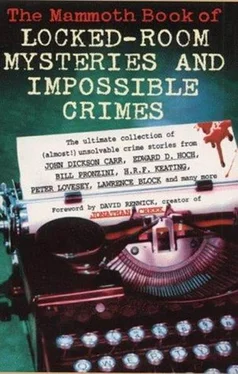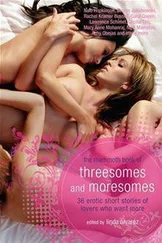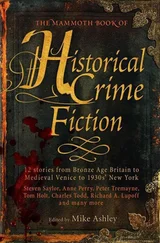Mike Ashley - The Mammoth Book of Locked-Room Mysteries And Impossible Crimes
Здесь есть возможность читать онлайн «Mike Ashley - The Mammoth Book of Locked-Room Mysteries And Impossible Crimes» весь текст электронной книги совершенно бесплатно (целиком полную версию без сокращений). В некоторых случаях можно слушать аудио, скачать через торрент в формате fb2 и присутствует краткое содержание. Жанр: Детектив, на английском языке. Описание произведения, (предисловие) а так же отзывы посетителей доступны на портале библиотеки ЛибКат.
- Название:The Mammoth Book of Locked-Room Mysteries And Impossible Crimes
- Автор:
- Жанр:
- Год:неизвестен
- ISBN:нет данных
- Рейтинг книги:3 / 5. Голосов: 1
-
Избранное:Добавить в избранное
- Отзывы:
-
Ваша оценка:
- 60
- 1
- 2
- 3
- 4
- 5
The Mammoth Book of Locked-Room Mysteries And Impossible Crimes: краткое содержание, описание и аннотация
Предлагаем к чтению аннотацию, описание, краткое содержание или предисловие (зависит от того, что написал сам автор книги «The Mammoth Book of Locked-Room Mysteries And Impossible Crimes»). Если вы не нашли необходимую информацию о книге — напишите в комментариях, мы постараемся отыскать её.
A new anthology of twenty-nine short stories features an array of baffling locked-room mysteries by Michael Collins, Bill Pronzini, Susanna Gregory, H. R. F. Keating, Peter Lovesey, Kate Ellis, and Lawrence Block, among others.
The Mammoth Book of Locked-Room Mysteries And Impossible Crimes — читать онлайн бесплатно полную книгу (весь текст) целиком
Ниже представлен текст книги, разбитый по страницам. Система сохранения места последней прочитанной страницы, позволяет с удобством читать онлайн бесплатно книгу «The Mammoth Book of Locked-Room Mysteries And Impossible Crimes», без необходимости каждый раз заново искать на чём Вы остановились. Поставьте закладку, и сможете в любой момент перейти на страницу, на которой закончили чтение.
Интервал:
Закладка:
His name was announced as if he had been an invited guest arriving at a country house, and from a group near the fireplace came forward to welcome him a young man with a delightful face. Glancing past him for an instant, as he advanced, Christopher saw Sidney Chester in evening dress; a dainty old lady whom he took to be her mother; a rather timid-looking little woman, whose pretty features seemed almost plain in contrast with Miss Chester’s; a handsome, darkly sunburnt young man, with a soldierly, somewhat arrogant air; also seven or eight strangers, divided into different parties scattered about the hall.
“How do you do? Is it possible we’re to have the pleasure of entertaining the famous Mr Race?” said the young man who came to greet Christopher. “My name is Morley Chester, and I play host for my cousins, Mrs Chester and her daughter.”
Christopher disclaimed the adjective bestowed upon him, but admitted that he was the person who had had a certain adventure in Dalvania, and one or two others that had somehow got into the papers. Then Mr Chester introduced him to the two cousins, mother and daughter (he meeting the girl as if for the first time), to the pretty, quiet young woman who was, it appeared, Mrs Morley Chester, and added an informal word or two which made Sir Walter Raven and Mr Christopher Race known to each other.
Sidney Chester’s fiancé was, after all, very pleasant and frank in manner, his haughty air being the effect, perhaps, of a kind of proud reserve. Christopher could not help feeling slightly drawn to the young man, as he usually was to handsome people; but there was no doubt in his mind that Mr Morley Chester was an agreeable person. He was not fine-looking, but his way of speaking was so individual and engaging that Christopher did not wonder at Miss Chester for referring to him as her dear cousin.
Assuredly he was the right man for this trying position. His tact and graciousness must put the shyest stranger at ease, and he struck the happy mean between the professional and amateur host, necessary in a country house where paying guests were taken.
He went with Christopher to show two or three rooms which were free, and the new arrival having selected one, and settled about the price, Morley Chester said, half laughingly, half ruefully, “I suppose you’ve heard about our mystery?”
Christopher confessed that rumours had reached him.
“We think it right to warn everyone who comes,” said his host. “Not that our warnings have much effect. People think nothing will happen to them – that they won’t be caught napping; or it amuses them to lose their things, as one gives up one’s watch or rings to a conjurer to see what he will do. At worst, though, you’re safe for some time.
“The ghostly thief – as we’ve begun to believe him – lets our visitors alone until just before they’re leaving. He always seems to know their intentions. It’s a new way of ‘speeding the parting guest.’ But, if I make light of our troubles, we feel them seriously enough in reality.”
Christopher was offered supper, but refused, as he had lately dined; and he did not go downstairs again until after the ladies had gone to bed. Then he joined the men in the smoking-room, and observed with veiled interest not only the guests, but the servants who brought in whisky and soda. There was not a face of which he could say to himself that the expression was sly or repellent.
Before Mr Chester and Sir Walter Raven no one mentioned the trouble in the house; but next morning, sitting in the hall which was the favourite gathering-place, he caught scraps of gossip. No one present had yet been robbed, but everyone had heard something queer from others who had left the place, and as a rich brewer, lately knighted, intended to go away in his motor after luncheon that day, he was being chaffed by his acquaintances.
“I suppose you’ll give your watch and money to your chauffeur before you sit down for the last meal?” laughed an American girl who had arrived some days before in her motor-car.
“No, I sha’n’t,” replied Sir Henry Smithson, valiantly. “I don’t believe in this nonsense. I’ll show you what I have got on me, and as I am now so shall I be when I go into the dining-hall.”
With this he displayed a gorgeous repeater, with his monogram and crest in brilliants; indicated a black pearl scarf-pin, turned a sapphire and diamond ring set in aluminium on a fat finger, and jingled a store of coins his pocket, which he announced to be gold, amounting to fifty pounds. “I’ve a few notes, too,” said he, “and I expect to have them just the same when I finish my lunch as when I go in.”
“Well, we shall all lunch at the same time, and watch,” remarked the American girl.
The paying guests at Wood House either breakfasted in their own rooms or in a cheerful morning room, more modern than most parts of the quaint old house; therefore, Christopher Race had not seen the dining-hall of which Miss Chester had spoken. He did not join in the conversation with the brewer; nevertheless, when he saw that gentleman swaggering to luncheon, he followed at a distance, everybody else moving in the same direction at the same time.
It was, indeed, a beautiful room, this dining-hall which Sidney Chester had praised. It was wainscoted to the ceiling in old oak carved in the exquisite linen fold pattern, and though it was worm-eaten and showed signs of excessive age, Christopher, who called himself a judge of antiquities, thought the panelling would be almost worth its weight in gold.
The tables for guests were arranged somewhat oddly, probably, Christopher supposed, with a view to showing off the room and its furniture to advantage. The tables were small, of a size to accommodate parties of from two to eight persons, and ranged along two sides of the dining-hall, placed against one of the walls. In the middle of the room stood a huge old refectory table, with carved sides and legs, and leaves to draw out, a splendid specimen of the Tudor period; but no plates were laid upon this. It was used as a serving table; and against the wall on the right of the door, as one entered from the great hall, was a magnificent oak sideboard, loaded with handsome pieces of ancient silver.
Christopher had a table to himself at the end of the long room, and Sir Henry Smithson sat at a larger one not far away. He had invited the American girl, her chaperon, and Sir Walter Raven to share with him his farewell meal, and much champagne flowed. There was a good deal of talk and laughter at that and other tables, but the luncheon was served by the butler and two footmen in ceremonious style, Mr Morley Chester unostentantiously superintending behind a screen which hid the door used by the servants. Not one of the three ladies of the Chester family was in the room.
All went on in the most orderly manner, and the food was good, as well as nicely served, though it struck Christopher that it was rather long between courses. He ate with good appetite until the meal was drawing to an end, when he began to realize that he was tired, and would be glad to get into the garden and smoke a cigarette. He liked the smell of the old oak which came to him from the panelled wall, yet he thought that the fresh air would be pleasant.
Suddenly, as Christopher was beginning upon biscuits and cheese, Sir Henry Smithson sprang up in his chair, exclaiming, “By Jove!”
Then came a clatter of voices at his table, both ladies there crying out in consternation.
“What has happened?” asked Morley Chester, coming out from behind the screen, while Sir Walter Raven sat looking pale and concerned, and the mild-faced butler saved himself from dropping a bottle of port.
“Everything has gone!” ejaculated Miss Reese, the American. “His watch and chain – his ring – his scarf-pin – and -”
Читать дальшеИнтервал:
Закладка:
Похожие книги на «The Mammoth Book of Locked-Room Mysteries And Impossible Crimes»
Представляем Вашему вниманию похожие книги на «The Mammoth Book of Locked-Room Mysteries And Impossible Crimes» списком для выбора. Мы отобрали схожую по названию и смыслу литературу в надежде предоставить читателям больше вариантов отыскать новые, интересные, ещё непрочитанные произведения.
Обсуждение, отзывы о книге «The Mammoth Book of Locked-Room Mysteries And Impossible Crimes» и просто собственные мнения читателей. Оставьте ваши комментарии, напишите, что Вы думаете о произведении, его смысле или главных героях. Укажите что конкретно понравилось, а что нет, и почему Вы так считаете.










